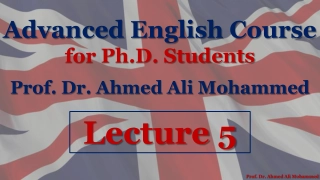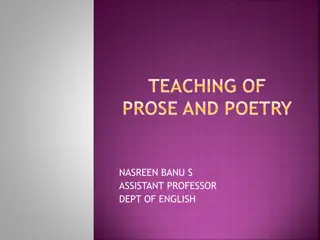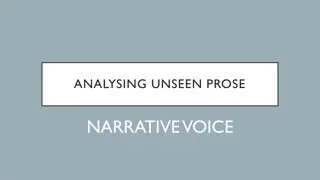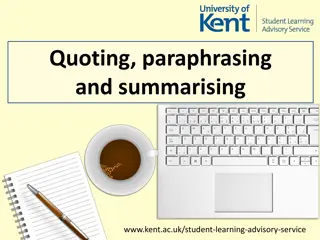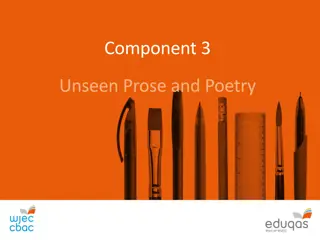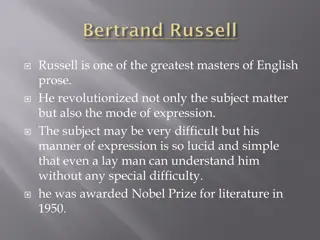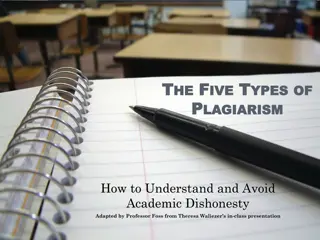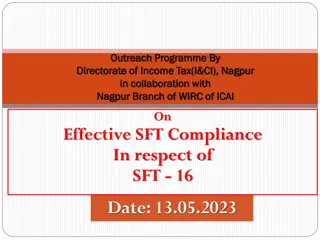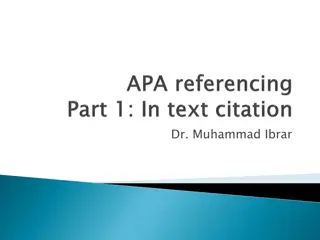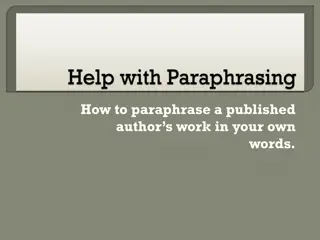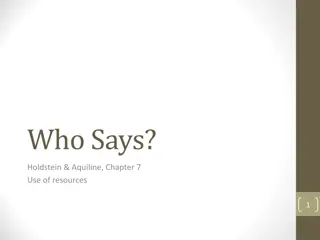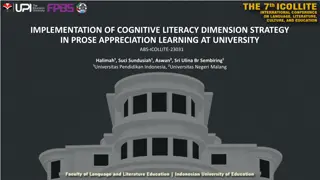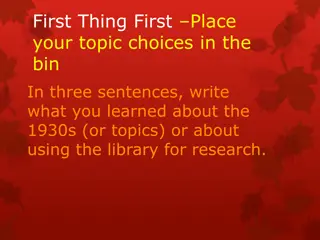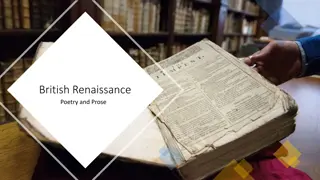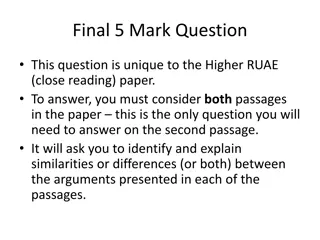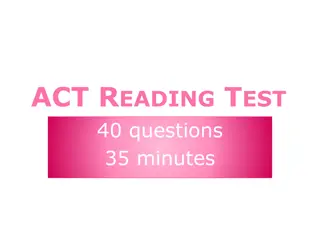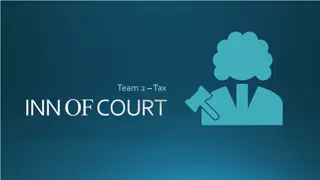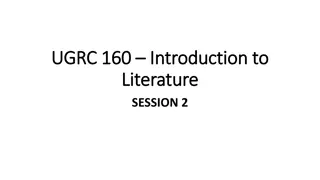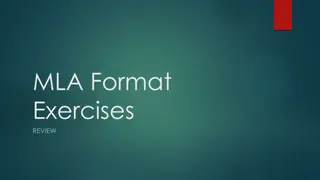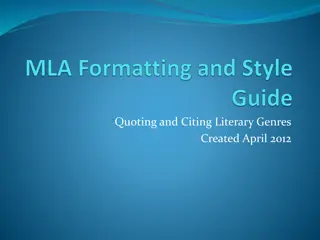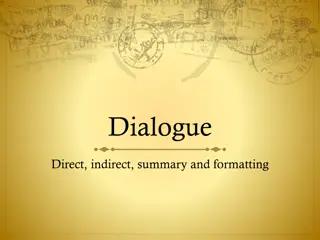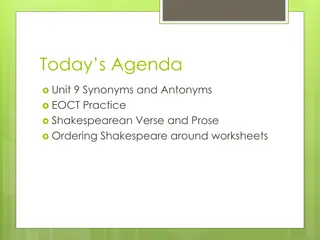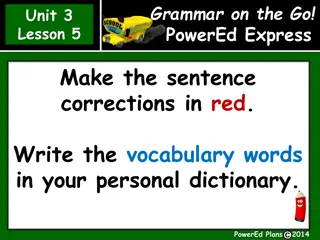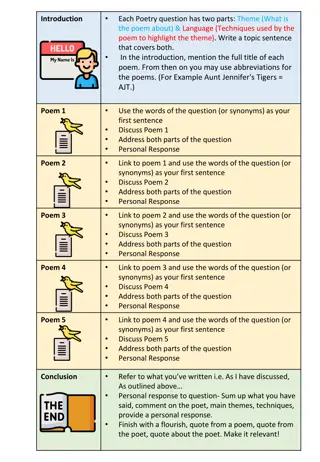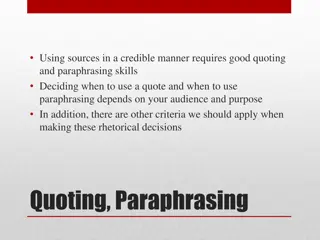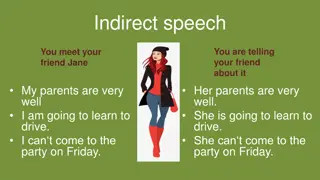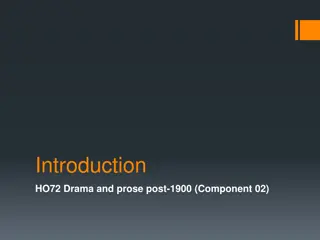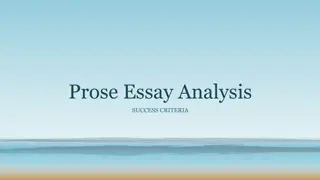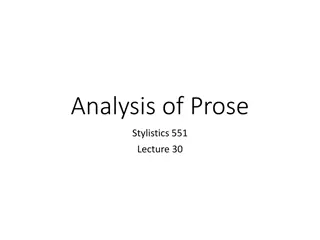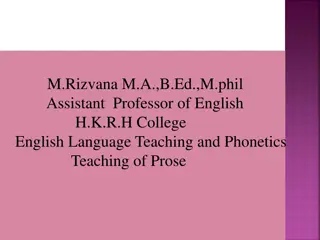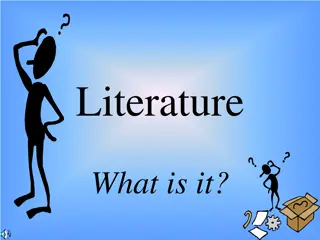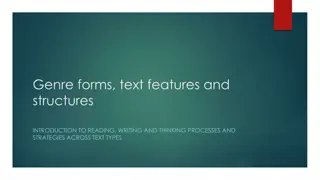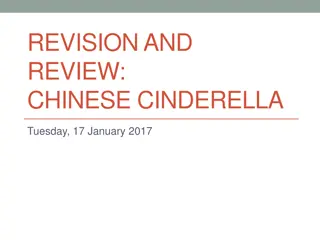Advanced English Course for Ph.D. Students
Prof. Dr. Ahmed Ali Mohammed's lecture on paraphrasing and quoting in academic writing. Learn strategies to develop paraphrasing skills and understand the purpose of paraphrasing in research.
0 views • 15 slides
Teaching of Prose and Poetry by Nasreen Banu - A Comprehensive Guide for English Learners
Delve into the intricacies of teaching prose and poetry with insights from Assistant Professor Nasreen Banu. Learn about the aims, general objectives, steps, and alternative methods for engaging students in English language learning. Enhance listening and speaking skills through a structured approac
0 views • 19 slides
Understanding Narrative Perspective in Unseen Prose Narratives
Explore the narrative voice in unseen prose narratives through the analysis of different narrative perspectives, such as homodiegetic and heterodiegetic narrators. Understanding these terms helps in interpreting the impact of perspective on storytelling and themes in literary texts for exam preparat
1 views • 17 slides
Mastering Quoting, Paraphrasing, and Summarizing Skills in Academic Writing
Understanding the importance of quoting, paraphrasing, and summarizing in academic writing, this tutorial explains when and how to use each method effectively. Quoting involves repeating exact words for crucial definitions or evidence, paraphrasing focuses on using your own words to convey understan
0 views • 14 slides
Insights into Unseen Prose and Poetry Analyses
Delve into the assessment of unseen prose and poetry with a focus on introductions, candidate evaluations, and critical engagement. Explore the importance of contextual references, vocabulary analysis, and integration of other readings in shaping responses to literary texts.
1 views • 12 slides
Exploring the Mastery of English Prose: The Style of Bertrand Russell
Bertrand Russell, a Nobel Prize-winning writer, revolutionized English prose with his lucid and simple expressions on complex subjects. Known for his use of long sentences, terseness, allusiveness, and irony, Russell's style combines clarity with deep meanings and continuity of thought. His allusion
0 views • 11 slides
Understanding Links in Textual Content
Learn how to identify and analyze links between ideas in a text by examining how specific sentences provide connections. Follow a structured approach of quoting, explaining, and analyzing words that link backwards and forwards to establish a clear understanding of the text's coherence.
2 views • 21 slides
GCSE English Literature Exam Overview
This overview provides information on the GCSE English Literature exam structure, content, and assessment objectives for both components. It includes details on the texts studied, such as Shakespeare, poetry, post-1914 prose/drama, and 19th-century prose. Students are assessed on their ability to re
0 views • 23 slides
GCSE English Literature Exam Overview
This GCSE English Literature exam overview provides details on the components, assessment objectives, text choices, and key information for students. It covers Shakespeare, Poetry, Post-1914 Prose/Drama, 19th Century Prose, and Unseen Poetry. Students will engage with a variety of texts ranging from
5 views • 23 slides
Understanding and Avoiding Plagiarism: Types, Consequences, and Prevention
Understand the five types of plagiarism, from intentional to unintentional, and learn how to identify, avoid, and properly cite sources to prevent academic dishonesty. Explore techniques for paraphrasing, quoting, and documentation styles like MLA and APA to ensure academic integrity.
5 views • 12 slides
Compliance Obligations and PAN Requirements for Financial Transactions
This outreach program by the Directorate of Income Tax in Nagpur, in collaboration with the Nagpur Branch of WIRC of ICAI, focuses on effective compliance with Statement of Financial Transactions (SFT). It covers PAN compliance obligations, forms, and penalties for non-compliance related to specifie
0 views • 14 slides
Mastering Source Citation Techniques for Research and Assignments
Explore the essential elements of referencing styles, including in-text citations and reference lists. Learn how to credit sources properly, cite ideas and theories, and direct readers to full source details. Understand the rules for citing authors, quoting specific parts, and referencing multiple a
2 views • 12 slides
Effective Techniques for Paraphrasing Academic Work
Paraphrasing published author's work requires time, understanding, and persistence. Recognize the distinction between quoting and paraphrasing, emphasizing the importance of citations. Avoid excessive quoting in social sciences, preferring paraphrasing. Spend ample time reading and discussing ideas
0 views • 23 slides
Effective Use of Sources in Academic Writing
Utilizing resources effectively in academic writing involves proper use of summarizing, paraphrasing, quoting, and selecting among these techniques based on importance. It is essential to avoid patchwriting, maintain clarity, and ensure the original work's integrity while crafting your argument.
0 views • 6 slides
Implementation of Cognitive Literacy in Prose Appreciation Learning
The study focuses on the implementation of cognitive literacy dimension strategy in prose appreciation learning at universities. It discusses the impact of technological advances on society and the importance of incorporating moral values in education. The research findings indicate that the cogniti
0 views • 8 slides
Practical Criticism: Analysis and Appreciation of Poetry and Prose
Delve into the world of practical criticism and critical appreciation in BA III English studies with a focus on analyzing and appreciating poetry and prose. Explore the history, significance, and methodology behind this literary practice while gaining insights into interpreting unseen poems. Discove
3 views • 20 slides
Understanding Plagiarism and Proper Citation Techniques
Plagiarism is a serious academic offense that involves using someone else's work without proper acknowledgment. This includes copying text from the internet without citation or failing to use quotation marks when quoting an author. It is important to cite sources correctly, even when summarizing or
0 views • 38 slides
British Renaissance Poetry and Prose: Influential Poets and Their Works
Explore the world of British Renaissance poetry and prose through the works of renowned poets like Sir Thomas Wyatt, Edmund Spenser, and Sir Philip Sidney. Dive into the evolution of the sonnet form, from Wyatt's introduction of the Italian/Petrarchan sonnet to Spenser's masterpieces like "The Faeri
1 views • 13 slides
Analyzing Agreement and Disagreement in High School RUAE Passages
This task involves identifying and explaining similarities or differences between arguments presented in two passages for the Higher RUAE (close reading) paper. The focus is on recognizing key areas of agreement or disagreement and providing supporting evidence from each passage to earn marks. Tips
1 views • 17 slides
Understanding Paragraph Organization in Historical Prose Writing
Explore the D-N-A structure of paragraph organization in historical prose writing, focusing on transitional words, revision strategies, and the inseparable connection between history and writing. Learn how to develop effective paragraphs that guide the reader through your historical narrative.
0 views • 18 slides
Understanding the ACT Reading Test Content
The ACT Reading Test comprises 40 questions to be answered in 35 minutes, covering four categories: Prose Fiction, Humanities, Social Sciences, and Natural Sciences. Each category has a specific percentage of questions. The test evaluates your ability to comprehend various passages, including prose
1 views • 24 slides
Quoting Ralph Waldo Emerson: A Chief Justice's Perspective on Tax Court Consistency
The Chief Justice of Canada's Tax Court referenced Ralph Waldo Emerson's famous quote in a judgment, highlighting the significance of avoiding foolish consistency. This insight offers a unique viewpoint in the world of tax jurisdiction, emphasizing the value of voluntary and self-assessed approaches
0 views • 50 slides
Understanding Paraphrasing, Summarizing, and Direct Quoting for MLA Style
Exploring the differences among paraphrasing, summarizing, and direct quoting in MLA style. Paraphrasing involves rewriting in one's words, summarizing captures main ideas concisely, and direct quoting requires identical replication. These methods add credibility, support arguments, and serve variou
0 views • 6 slides
Understanding Elements of Fiction in Prose Writing
This session delves into the essential elements of fiction in prose writing, covering plot development, characterization, setting, and more. Students will learn to analyze and interpret these elements in stories, with a focus on applying their understanding to a specific short story. Through detaile
0 views • 15 slides
MLA Format Exercises Review
This document provides exercises on in-text citations, works cited entries, quoting, the use of brackets, slashes, and ellipsis in MLA format. It includes examples and practice exercises for each component to help improve understanding and application of MLA citation rules.
0 views • 7 slides
Modern Language Association (MLA) Guidelines for Quoting and Citing Literary Genres
Learn how to properly quote and cite literary genres following the MLA Handbook for Writers of Research Papers. Explore guidelines for citing authors in parenthetical citations and incorporating prose quotations into your text, including handling question marks and block quotes.
0 views • 16 slides
Mastering Dialogue: Direct, Indirect, Summary & Formatting
Good dialogue should be believable and distilled, conveying the essence of conversations without filler. Direct quotations are used for critical moments, while indirect speech allows characters to speak freely without quoting verbatim. Dialogue can set the mood, advance the action, and reveal charac
0 views • 10 slides
Understanding Shakespearean Verse and Prose: A Comprehensive Guide
Delve into the intricate world of Shakespeare's language with a focus on prose, rhymed verse, and blank verse. Learn how to distinguish between these forms and their significance in his plays through visual and textual clues. Explore examples of rhymed couplets and heroic couplets, shedding light on
0 views • 24 slides
Grammar on the Go! PowerEd Express Unit 3-5 Sentence Corrections & Punctuation Tips
Improve your grammar skills with this lesson on correcting sentences and using proper punctuation. Learn about sentence types, capitalization, quoting dialogue, and more. Enhance your writing and communication abilities with insightful tips and examples.
0 views • 11 slides
Crafting Literary Analyses: Study of Poetry Themes and Language Techniques
Explore an insightful approach to analyzing poetry themes and language techniques through a structured paragraph template. Delve into five poems, dissect their themes and techniques, and craft personal responses to each piece. Uncover the beauty of poetry with a systematic examination that includes
0 views • 4 slides
Effective Use of Quoting and Paraphrasing in Academic Writing
Learning when to quote and when to paraphrase in academic writing is crucial for credibility. Quotations should be used sparingly, with attribution and relevant introductions. Signal verbs like acknowledges, claims, and more enhance attribution. Citing sources effectively adds credibility to your wo
0 views • 12 slides
Understanding Indirect Speech: Examples and Practice
Indirect speech involves reporting what someone else has said without quoting them directly. In this content, you will find examples and exercises on how to convert direct speech into indirect speech, covering statements, commands, and requests. Practice transforming sentences like "My parents are v
0 views • 8 slides
Study of Modern Drama and Prose Post-1900
This component focuses on the study of a modern play (The History Boys) and a modern prose text (The Great Gatsby). Learners explore cultural and contextual influences on writers and readers, analyze literary texts, demonstrate understanding of contexts, and make connections across texts. The examin
0 views • 23 slides
Prose Essay Analysis Success Criteria
Explore the steps involved in analyzing a prose essay for success criteria. From reading the exemplar essay to developing criteria and reflecting on improvement strategies, this process aims to enhance writing skills and achieve measurable goals in future essays.
0 views • 6 slides
Understanding Stylistic Analysis in Literature
Stylistic analysis in literature involves examining linguistic features like lexis, grammar, foregrounded elements, and context to distinguish between literary and non-literary prose. While poetry allows for whole text analysis due to its brevity, prose analysis often focuses on selected extracts fo
0 views • 16 slides
Streamlining Freight Quoting and Management with GreenScreens Platform
Revolutionize your freight operations with GreenScreens, a powerful platform offering features like lane data analysis, quoting tools, customer rate sending, and batch quoting capabilities. Enhance efficiency, optimize rates, and win more business seamlessly in the competitive logistics landscape.
0 views • 8 slides
Effective Strategies for Teaching English Prose - A Comprehensive Guide
Teaching English prose is a fundamental aspect of language education, focusing on reading comprehension, vocabulary enrichment, and writing skills. This guide covers the objectives of teaching prose, including enhancing comprehension, pronunciation, vocabulary, and writing abilities. It emphasizes i
0 views • 21 slides
Exploring the World of Literature
Literature encompasses various genres such as poetry, drama, and prose, each with unique elements and characteristics. It provides a platform for expressing ideas, emotions, and stories in a creatively compelling manner, capturing the interest of readers for generations. Discover the artistry of poe
0 views • 12 slides
Understanding Genre Forms, Text Features, and Structures in Reading, Writing, and Thinking
Explore the world of genre forms, text features, and structures in this engaging session. Learn to classify different texts, recognize generic features, and understand the main literary genres including prose, poetry, and drama. Delve into the nuances of prose writing, the musical quality of poetry,
0 views • 22 slides
Analysis of Structure and Form in Chinese Cinderella
Explore the internal organization and prose style of the text "Chinese Cinderella" through an examination of structure, narrative form, dialogue usage, and character development. Dive into how the sections are divided, the use of dialogue to define characters, and the indicators that stand out in th
0 views • 6 slides
